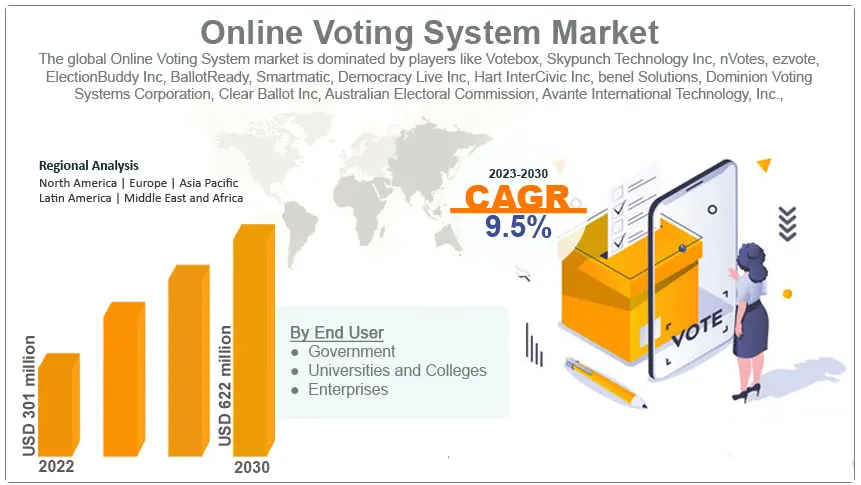Table of Contents
Electronic voting or e-voting systems have seen increased adoption globally to modernize existing voting processes and enable remote participation. However, challenges in security, transparency and scalability have limited their large-scale use, especially for national elections.
Blockchain, with its inherent capabilities of decentralization, immutability and transparency, is increasingly being explored as an underlying technology to develop more trustworthy and scalable electronic voting systems.
This post aims to provide a comprehensive overview of Blockchain-Based Electronic Voting System Development by discussing key aspects including current implementations, advantages, best practices and the future outlook.
Key Statistics: Blockchain‐Based Electronic Voting System
E-voting systems were first implemented in early 2000 but raised security concerns that limited their widespread adoption. As of 2020, Blockchain Based Voting System Development and pilots have been conducted in at least 8 countries including Estonia, Russia, Sierra Leone, Kazakhstan and Switzerland.
- Global e-voting market is projected to grow at over 9.5% CAGR between 2022 and 2030, with Blockchain Based Voting System Development potentially capturing nearly 30% market share by 2025 (Industry Reports).
- As of 2020, blockchain-based e-voting pilots have been conducted in at least 8 countries, including Estonia and Switzerland, although no large-scale national election has been fully executed on this infrastructure yet (MDPI).
- Approximately 20 organizations worldwide, including Harvard and MIT, are actively developing blockchain-based electronic voting systems.

What is a Blockchain-Based Electronic Voting System?
In a traditional e-voting system, votes are stored in centralized databases managed by electoral authorities. In contrast, a Blockchain-Based Electronic Voting System utilizes a decentralized peer-to-peer network of nodes running the Blockchain software, to store and process votes using distributed ledger technologies. Voters interact with a user-friendly interface to anonymously cast their votes which get recorded as cryptographically secured transactions on the shared Blockchain database.
This immutable record of all transactions provides high transparency since any citizen or oversight agency can independently verify votes with Blockchain based voting system development. Smart contracts enable automatic vote- counting without third-party tampering risks prevalent in centralized servers. The decentralized consensus mechanisms ensure votes are finalized and stored in a trusted, verifiable yet private manner without central control. This overcomes many hurdles of the earlier e-voting generations.
Why Use Blockchain for Electronic Voting System?
There are several key benefits that make Blockchain technology very suitable for developing advanced E-voting systems with better security, privacy, transparency and immutability than previous alternatives:
Decentralization
By distributing the voting data across thousands of nodes instead of a central database, Blockchain removes single points of failure or manipulation risks.
Transparency
Every transaction i.e. vote cast is permanently, chronologically recorded for public visibility and auditability without revealing voter identities.
Immutability
Once recorded, votes cannot be altered or removed without detection even by administrators, preventing “changing after the fact”.
Privacy
Anonymity of votes is preserved using advanced cryptographic tools like zero-knowledge proofs while double voting prevention is still possible.
Accessibility
Eligible citizens can vote remotely from any online or mobile device instead of limited polling booths.
Auditability
Independent entities can cryptographically verify final tally matches individual votes cast without third party mediation.
Cost Efficiency
Blockchain voting eliminates physical infrastructure and ongoing server maintenance costs of traditional systems.
Therefore, Blockchain provides a promising framework for secure, transparent and inclusive Blockchain-Based Electronic Voting System Development globally.
Key Features to Add on Blockchain‐Based Electronic Voting System Development
The following are some essential features to incorporate while developing Blockchain-based voting platforms:
Voter Authentication: Secure identity verification of voters through Government IDs, biometric scans or digital signatures for one person-one vote.
Eligibility Checking: Validation of voter age, citizenship and registration status using linked databases or document hashes.
Secret Balloting: Privacy of votes ensured through advanced cryptographic tools like blind signatures, zero-knowledge proofs or ring signatures.
Verifiability: Allow voters to confirm their votes were submitted successfully and independently tally votes.
Integrity of Ballots: Immutable recording of vote transactions protects against tampering or ballot-box stuffing.
Accessibility: Support diverse set of devices for mobile, remote and accessibility-enabled voting.
Vote Changeability: Give voters flexibility to alter vote choice within the voting window before final submission.
Encrypted Voting Period: Keep votes encrypted on shared ledger during voting phase till final tallying.
Redundancy: Maintain synchronized copies of voting ledger on geographically decentralized nodes for higher uptime.
Scalability: Architecture facilitates secure participation of millions of voters through optimized algorithms.
Auditing: Allow independent audits of election records and final tallies by oversight agencies.
By developing the above functionalities using latest Blockchain and cryptography advances, transparent and dependable Blockchain-Based Electronic Voting System Development can be realized.
Enhance Election Security with Blockchain Voting Systems
Challenges in Developing a Blockchain-Based Electronic Voting System
While Blockchain provides various advantages, its application in e-voting also poses technical challenges:
Scalability
Blockchain networks today cannot process thousands of TPS needed for large polls instantly without latency issues. Solutions like state channels, sharding are emerging but not mature.
Storage Overhead
Storing vote ledger of millions or crores requires huge disk space across numerous full nodes which must be incentivized.
Network Congestion
Simultaneous voting during election hours may slow nodes due to transaction flood and increase gas fees.
Voter Education
Voters need awareness about new technologies like public/private keys to use Blockchain E-Voting anonymously but traceably.
Smart Contract Security
Centralized voting applications or smart contracts built on top of Blockchain are prone to software vulnerabilities.
Volatility Risk
Cryptocurrencies powering voting tokens or coins fluctuate in value unlike fiat money, affecting user experience.
Internet Penetration
Significant population globally still lacks robust online access needed for inclusive remote Blockchain voting deployment.
Regulatory Acceptance
Election commissions need to introduce legal amendments permitting use of emerging technologies replacing traditional methods.
Sybil Attacks
Malicious actors may spawn fake voter identities or manipulate consensus in permissionless networks.
Overcoming such difficulties necessitates extensive assessment, testing and review of Blockchain-based e-voting designs before large-scale implementation for elections.
Best Practices for Blockchain‐Based E-Voting System Development
Adhering to certain development standards and governance protocols can help address challenges and deliver transparent, robust Blockchain-Based Electronic Voting System Development solutions:
- Use permissioned networks with authenticated nodes instead of open networks vulnerable to Sybil attacks.
- Conduct security audits and bug bounties by expert cryptographers on voting smart contracts, clients and node software.
- Adopt established consensus mechanisms like proof-of-stake over energy-intensive proof-of-work to reduce latency and costs.
- Keep voting periods short and allow altering choices but applying cryptographic commitments for vouching immutability.
- Leverage zero-knowledge proofs, ring signatures or other advanced techniques to strictly separate vote content from identity.
- Incentivize nodes through transaction fees or coins in private/consortium chains to ensure uptime during elections.
- Take utmost care in architecture, development and deployment following standards like NIST, Kantara or ISO to mitigate risks.
- Pilot limited, verifiable elections in phases with select demography before scaling up for binding national polls.
- Consider both public as well as consortium or dedicated Blockchain platforms based on use cases, partners and legal settings.
By establishing and abiding to best practices, the credibility and widespread adoption of Blockchain-Based Electronic Voting System Development efforts can be enhanced.
Technologies Used in Blockchain E-Voting Systems
Various Blockchain protocols, consensus algorithms and cryptography tools are implemented depending on requirements of different Blockchain-Based Electronic Voting System Development solutions:
Blockchain Protocols
Most use public Ethereum blockchain for Electronic Voting System and its wide adoption and smart contract programmability. Others deploy custom or Hyperledger-based private chains.
Consensus Models
Delegated Proof-of-Stake (DPoS) is common for enhanced speed and reduced energy usage compared to Proof-of-Work used by Bitcoin and Ethereum 1.0.
Cryptography
Zero-knowledge proofs like zk-SNARKs for privacy-preserving authentication and voting. Blind/ring signatures hide voter identities. Commitments for vote immutability. Homomorphic encryption enables vote aggregation.
Languages
Solidity for Ethereum smart contract coding. Golang, Java for node implementation in other frameworks like Hyperledger, Corda.
UI Tools
JavaScript, React for frontend DApp interfaces accessed via browsers. Android, iOS apps for mobile voting access.
Data Tools
IPFS for distributed storage avoiding single points of failure. Oracle services to feed external data into contracts.
By leveraging the latest advances in cryptography and evolving Blockchain, secure yet scalable Blockchain-Based Electronic Voting System Development stacks can be engineered to meet standards for democratic elections worldwide.
Future of Blockchain‐Based Electronic Voting Systems
Blockchain voting is transforming from initial proof-of-concepts into regulated, scrutinized governance tools with immense future potential:
- Scalable Infrastructure: Through state channels, plasma sidechains, sharding and optimized node hardware, millions of votes per minute handling may be possible within this decade.
- Cross-Border Participation: Citizens living overseas can securely participate in their country’s self-governance using any Internet-enabled device from remote areas.
- Linked Verifiability: Advanced cryptography will enable independent tally verification by any citizen through anonymously linked receipts without loss of privacy.
- Tamper-Proof Auditing: Authorized oversight bodies can cryptographically and immutably audit complete election records perpetually maintained on Blockchain.
- Accessible Voting: Blockchain voting powered through biometrics or digital IDs will help disenfranchised demography including disabled cast confidential ballots securely.
- Multi-Dimensional Outcomes: Voters can express nuanced, multi-aspect preferences on interlinked issues through on-chain decision schemes beyond binary choices.
- Global Standards: Mature regulatory, technical and legal frameworks need evolving through consortiums for seamless cross-border e-voting.
- Alternative Applications: Blockchain voting can democratize organizational governance, polls, community votes beyond political elections worldwide.
By enabling verifiable, remote participation at a previously unseen scale, Blockchain will continue transforming democratic decision making using distributed ledger technology.
How A3Logics Can Develop a Blockchain‐Based Electronic Voting System?
A3Logics is a global leader in Blockchain Software Development Services with a dedicated team of experts and a proven track record of delivering successful Blockchain projects. Our capabilities in this domain include:
- Architecture design of permissioned/public voting DApps securing identities, votes and tallying.
- Development of advanced smart contract code managing voting processes on Ethereum or other ledgers.
- Implementation of state-of-the-art cryptography like zero-knowledge proofs, ring signatures for anonymity.
- Integration of trusted hardware security modules for anonymizing biometric/digital credentials.
- Building scalable, high-performance consensus backends, APIs optimized for elections.
- Quality testing using fuzzing, penetration techniques to uncover vulnerabilities.
- Hosting nodes on geographically decentralized clouds for redundancy and high uptime.
- Deploying incentives for altruistic nodes, payment gateways on behalf of electoral bodies.
- Compliance with global e-voting standards and assisting with audits, certifications.
Leveraging our extensive domain expertise and being the top DeFi Development Company, A3Logics can architect and deliver production-ready Blockchain-Based Electronic Voting System Development solutions engineered for transparency, scalability and security demanded by modern democracies.
Transform Your Blockchain Vision into Reality – Book a Free 30-Minute Consultation Today!
Final Take
This article provided a comprehensive review of how Blockchain technology can revolutionize electronic voting by developing more transparent, accessible and trustworthy systems through distributed ledger frameworks. Despite technical hurdles, the benefits of blockchain for e-Voting System Development including its decentralized architecture, cryptographic privacy, transparency and verifiability make it a promising avenue. With research and implementation progressing each year backed by commercial entities and academic institutions, Blockchain-Based Electronic Voting System Development holds immense potential for large-scale democratization globally in future especially if standards, policies and infrastructure rapidly evolve to support this new paradigm of digital suffrage. So, if you are looking to Hire Blockchain Developers, connect with A3Logics now!
FAQs
How does blockchain for e-Voting System Development ensure the security of votes?
Blockchain‐Based Voting Management System distributes vote records across thousands of nodes instead of central servers, removing single tampering points. Cryptography provides transparency via immutable, verifiable records while anonymizing voter identities. Tamper-proof smart contracts automate vote-processing.
What are the advantages of using blockchain for e-Voting System Development?
It enables remote, inclusive participation while offering transparency via public ledgers. Voters can independently verify final tallies. Immutability prevents altering of past votes. Privacy-enhancing cryptography separates voter identity from votes. Scalability may soon support millions of voters per election.
Can blockchain for e-Voting System Development handle large-scale elections?
Current technology is still evolving to securely process thousands of votes per minute needed for national polls. With rapid technical progress, Blockchain‐Based Voting Management System may reliably support millions of participants within a decade by leveraging optimizations like sharding, state channels etc.
How much does blockchain for e-Voting System Development cost?
Costs of Blockchain‐Based Voting Management System depend on requirements, scale and underlying platform. Simple proof-of-concepts range from $50,000-$200,000. Production-grade frameworks meeting regulatory standards for medium-sized demographics may cost $500,000 to multi-million dollar ranges. Annual maintenance is 5-15% of development costs.
Which blockchain for Electronic Voting System platforms are commonly used?
Ethereum is widely used due to smart contracts and a vibrant developer community. Others include Hyperledger, Corda for enterprise solutions. Some trials use Bitcoin, Tendermint or Tendermint-based Cosmos SDK. Platform selection is based on performance needs, budget, trust model and interoperability requirements.






